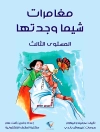Rainbow Valley – Lucy Maud Montgomery – Rainbow Valley (1919) is the seventh book in the chronology of the Anne of Green Gables series by Lucy Maud Montgomery, although it was the fifth book published. While Anne Shirley was the main protagonist of the previous books, this novel focuses more on her six children and their interactions with the children of Anne’s new neighbour, Presbyterian minister John Meredith. The work draws heavily on Montgomery’s own life in the Leaskdale Manse, where she wrote a large number of books.
The book is dedicated: ‘To the memory of Goldwin Lapp, Robert Brookes and Morley Shier who made the supreme sacrifice that the happy valleys of their home land might be kept sacred from the ravage of the invader.’ This refers to World War I, which is the main theme of the next and final book in the series, Rilla of Ingleside.
Plot summary – Anne Shirley has now been married to Gilbert Blythe for 15 years, and the couple have six children: Jem, Walter, Nan, Di, Shirley, and Rilla.
After a trip to London, Anne returns to the news that a new minister has arrived in Glen St. Mary. John Meredith is a widower with four young children: Gerald (Jerry), Faith, Una, and Thomas Carlyle (Carl). The children have not been properly brought up since the death of their mother, with only their father (who is easily absorbed by matters of theology) to parent them. The children are considered wild and mischievous by many of the families in the village (who tend only to hear about the Meredith children when they have got into some kind of scrape), causing them to question Mr. Meredith’s parenting skills and his suitability as a minister.
For most of the book, only the Blythes know of the Meredith children’s loyalty and kindness. They rescue an orphaned girl, Mary Vance, from starvation, and Una finds a home for her with Mrs. Marshall Elliott (Miss Cornelia Bryant). When the children get into trouble, Faith sometimes tries to explain their behaviour to the townsfolk, which generally causes an even bigger scandal.
Lucy Maud Montgomery
Rainbow Valley [EPUB ebook]
Rainbow Valley [EPUB ebook]
Koop dit e-boek en ontvang er nog 1 GRATIS!
Taal Engels ● Formaat EPUB ● Pagina’s 291 ● ISBN 9783347638808 ● Bestandsgrootte 0.8 MB ● Leeftijd 60-17 jaar ● Uitgeverij tredition ● Stad Ahrensburg ● Land DE ● Gepubliceerd 2022 ● Downloadbare 24 maanden ● Valuta EUR ● ID 8385788 ● Kopieerbeveiliging Sociale DRM












